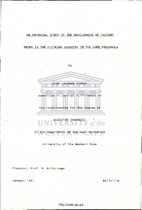| dc.description.abstract | Since the beginning of the nineteen-eighties factory shops
in the clothing industry in the Cape Peninsula have had an
increasing influence on the retail trade. Originally factory shops were mainly used by factories to
sell damaged goods at the end of the season. On account of
the (particularly) short product life cycle of their merchandise,
clothing factories started to use factory shops
more and more to sell quality clothes (e.g. overproduction,
canceled orders, etc.) of a current season directly to the
consumer. This approach brought about conflicts in the distribution channel as the traditional responsibilities and
values of each channel member were rearranged. The clothing industry in South Africa in general, and in
the Cape Peninsula, in particular, is controlled by 6 retailers. The forward integration by clothing factories (i.e. through establishing their factory outlets), inter alia, challenging the status quo as the leadership of the distribution channel had been questioned. Based on certain theories on distribution channel development and distribution channel entry, this study concentrated on determining the scope of factory shops, as well as on "establishing reasons for their development. Although environmental variables (e.g. inflation, backward vertical integration by retailers, economic conditions, etc.) have had a significant impact on the establishment of
factory shops, clothing factories also realized the existence of excellent opportunities for profit maximization under adverse economic conditions. Primarily, it was the small who rose against factory threatened; in addition, independent clothing retailers shops as their existence was the leading position of large retailers came under threat. Several theories on the evolution of distribution channels make provision for the entry of factory shops. Factory shops entered the distribution channel with a strong emphasis on price strategy and little (or sometimes even no) emphasis on the non-price marketing instruments. However" with time factory shops increasingly incorporated non-price marketing instruments (e.g. promotion, distribution, and product). As a result of their incorporating
additional services, factory shops were upgraded and may therefore face new competitors in the future. The South African experience of the influence and permanency of factory shops is too short to present any clear guidelines. However, if the development of factory shops in the retail structure of the United States of America is any indicator, factory shops will be a permanent add it ion to the distribution channel. Factory shops in the U. S.A. are not confined to the clothing industry but have expanded to include every imaginable consumer article.
Retailers who originally pressurized clothing factories to close their factory outlets (selling quality and in-season
merchandise) with have to accept and adapt to this interchange in the type of competition. Failing this, the independent retailer may disappear. Since the development of the hypermarket concept in the seventies, developments in the distribution channel in
retailing stagnated. The consumer, therefore, was susceptible to the change that the entry of factory shops has
brought about in the distribution channel of the clothing industry in the Cape Peninsula. | en_US |

